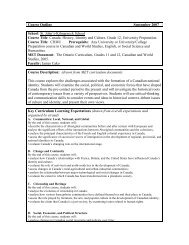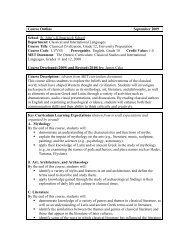2009-2010 SJK Annual Report - St. John's-Kilmarnock School
2009-2010 SJK Annual Report - St. John's-Kilmarnock School
2009-2010 SJK Annual Report - St. John's-Kilmarnock School
Create successful ePaper yourself
Turn your PDF publications into a flip-book with our unique Google optimized e-Paper software.
animals it fosters. Mr. Spackman held up a<br />
book depicting all manner of exotic<br />
creatures: macaws, spider monkeys, poison<br />
dart frogs and river dolphins. I stared,<br />
engrossed by the almost impossible nature<br />
of these creatures - so different from the<br />
squirrels and Canada geese that roamed<br />
the property of <strong>SJK</strong>. And yet, Mr. Spackman<br />
told us, these creatures were in danger.<br />
The Amazon rainforest was being<br />
deforested at a rate that boggled my 9<br />
year old mind.<br />
The connection between Nauru and<br />
the Amazon that fired up my memory is<br />
fairly clear. In both cases, man’s<br />
economically driven activities - the<br />
consumption of fossil fuels and<br />
deforestation - pose an existential threat.<br />
But as I reflected upon this connection, a<br />
reality about my own upbringing became<br />
clear: my concern over climate change is<br />
directly attributable to my experiences at<br />
<strong>SJK</strong> - specifically, to the remarkably<br />
consistent exposure to environmental<br />
concerns that I received over my 13 years<br />
as a student.<br />
I fondly recall trooping through<br />
meadows and learning about symbiotic<br />
relationships in outdoor science classes<br />
with Mr. Curry in Grade 4, or staying up all<br />
night for the 24 hour study of the pond’s<br />
biophysical systems with Mr. Zink in Grade<br />
7. Upper school brought more intensive<br />
investigations into the natural sciences,<br />
such as the two bleary-eyed weeks my<br />
Grade 10 class spent up at Dorset<br />
studying northern Ontario’s natural<br />
environment in the fall and winter. Grade<br />
11 gave me the eye-opening chance to<br />
study marine science in the Bay of Fundy<br />
through a unique course that <strong>SJK</strong> offered.<br />
Time and time again the complexity,<br />
vulnerability and importance of the natural<br />
environment was impressed upon me.<br />
Never has such knowledge been more<br />
important. Decades of scientific evidence<br />
point to an uncomfortable but undeniable<br />
truth: through pollution, resource<br />
consumption and climate change we are<br />
damaging the delicate biophysical systems<br />
upon which human society depends for its<br />
well-being and long-term survival. The<br />
complexity of the interlinkages between<br />
the natural and man-made systems<br />
enmeshing the planet make the precise<br />
consequences of this damage difficult to<br />
predict. Nevertheless, it is safe to say that<br />
a world defined by climatic instability,<br />
pollution, food and water shortage,<br />
decreased biodiversity and increased<br />
economic disparity is one we cannot<br />
comfortably gift onto our children and<br />
grandchildren. Yet this is precisely what we<br />
are doing.<br />
It many ways, our inaction is<br />
understandable. It is phenomenally difficult<br />
to cumulatively alter our lifestyles in<br />
meaningful ways - human society is<br />
marked by significant inertia. Many hurdles<br />
stand in our way to a sustainable future,<br />
some technical, some economic. Perhaps<br />
the most problematic of these, however,<br />
are socially constructed by powerful<br />
actors with a vested interest in the status<br />
quo. As such, mankind’s long-term<br />
prosperity hinges upon the mainstream<br />
acceptance that environmentalism is the<br />
domain of reasonable-minded pragmatists,<br />
not radical thinkers. This is a lesson that<br />
needs to be urgently and consistently<br />
impressed upon young students<br />
everywhere. It is not simply faraway climes<br />
like Nauru or the Amazon that depend<br />
upon our success in this endeavour, but all<br />
of human society.<br />
I learned many things in <strong>SJK</strong>’s<br />
classrooms. Some have served me well in<br />
my post-secondary life, others perhaps<br />
less so. I sincerely believe, however, that<br />
the most important lesson <strong>SJK</strong> taught me<br />
was about mankind’s complex and<br />
inextricable connection to the<br />
environment. I will always have fond<br />
memories of the forward-thinking<br />
teachers at <strong>SJK</strong> who work so hard to pass<br />
this vital lesson on to future generations.<br />
Andrew Reid ‘03 graduated from the<br />
University of <strong>St</strong>. Andrews, Scotland, in 2007,<br />
and has just completed an MA in Global<br />
Governance from the University of Waterloo.<br />
He has conducted climate change research<br />
for Friends of the Earth Canada and the<br />
David Suzuki Foundation, and was a delegate<br />
to United Nations for the Republic of Nauru.<br />
He has recently accepted a research position<br />
with the Ecologic Institute, an environmental<br />
think tank in Berlin, Germany, and plans on<br />
pursuing a PhD in International Relations.





